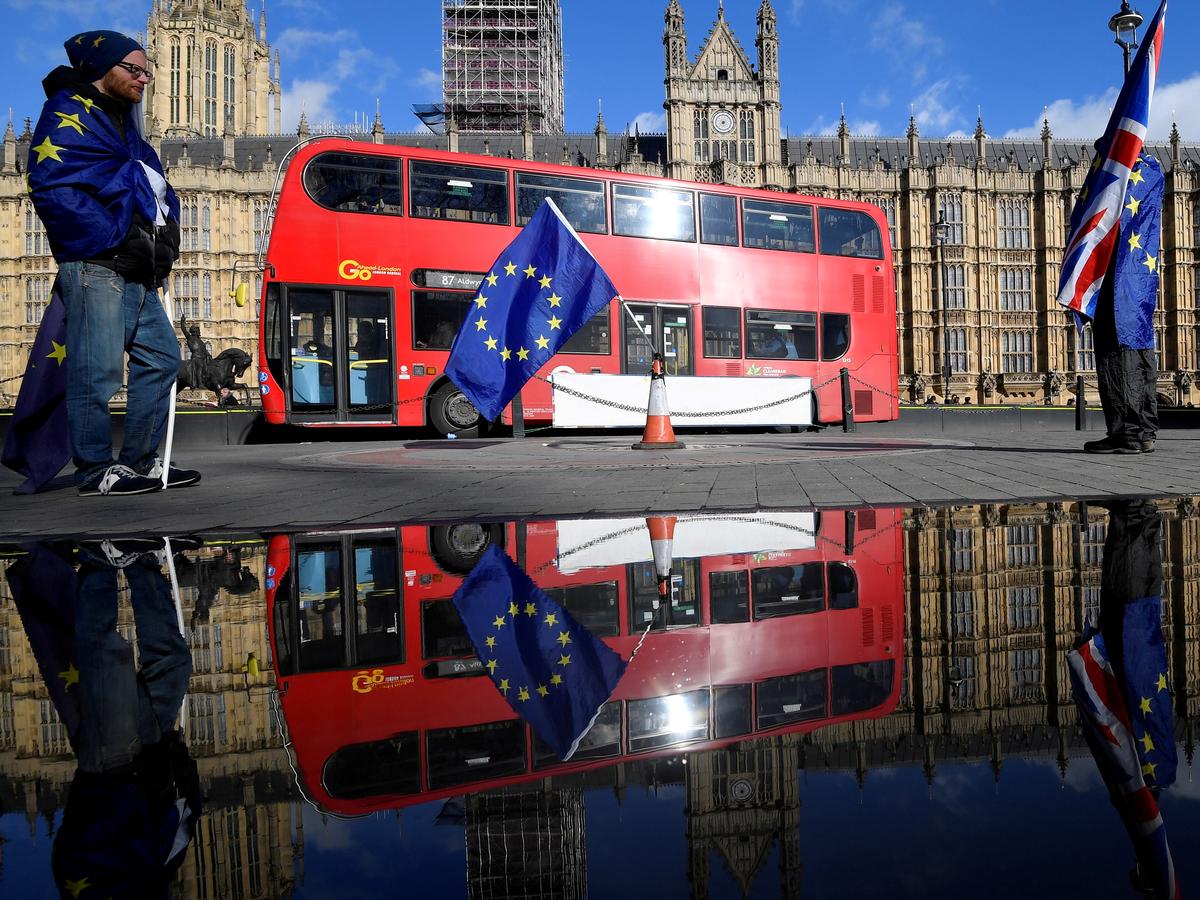LONDON – Internet immigration to Britain sank to its lowest since 2013 through the 12 months to the top of March, pushed by a sustained fall within the variety of immigrants from the European Union since 2016’s Brexit referendum, official figures confirmed on Thursday.
Anti-Brexit demonstrators waving EU and Union flags are mirrored in a puddle in entrance of the Homes of Parliament in London, Britain, March 28, 2018. REUTERS/Toby Melville/Recordsdata
Rising immigration was a serious public concern when Britain voted to depart the EU, although it has since dropped down individuals’s listing of worries. Nonetheless, Prime Minister Boris Johnson’s authorities plans to introduce restrictions on EU migration as after Britain leaves the bloc on Oct. 31.
Some 612,000 individuals moved to the UK through the 12 months to March, whereas 385,000 individuals emigrated, decreasing web immigration to 226,000, its lowest because the 12 months to the top of December 2013, the Workplace for Nationwide Statistics mentioned.
The information relies on a brand new experimental collection that goals to scale back earlier flaws that led to an undercounting of EU long-term immigrants and overestimating what number of non-EU college students remained in Britain after their research.
Even after these changes, web inflows of non-EU migrants stay near the file excessive of 236,000 set within the 12 months to September 2018, at 219,000 within the 12 months to March.
Nonetheless the online variety of EU immigrants seems to have fallen sharply, to 59,000 within the 12 months to March from a peak of 218,000 in 2015.
This is without doubt one of the lowest figures previously 10 years, although comparisons are approximate because the ONS has to this point solely utilized its newest, extra correct estimation strategies to EU migration knowledge from earlier than June 2016.
DEBT CRISIS
Immigration to Britain from the remainder of the European Union surged after the euro zone debt disaster in 2012, as southern Europeans sought higher job alternatives in Britain, on prime of east Europeans looking for greater wages.
Madeleine Sumption, director of the College of Oxford’s Migration Observatory, mentioned the information pointed to a return to the pre-financial disaster development in web EU migration, and widespread departures of present EU residents in Britain appeared unlikely.
“EU emigration (is) nonetheless vital however now steady – and never the ‘mass post-Brexit exodus’ some talked about. Maybe not shocking – most EU residents (are) now resident right here for some time, so are fairly settled,” she mentioned.
Immigration from exterior the EU, which Britain’s authorities has far more authorized management over, has steadily risen after a dip in the course of the last decade, regardless of a British authorities objective to chop whole web immigration to beneath 100,000 a 12 months.
Johnson has mentioned that after Brexit, future immigrants from the EU will likely be topic to a “skills-based” check just like that utilized by Australia, in addition to legal file checks.
MigrationWatch, a gaggle that wishes much less immigration, mentioned after Thursday’s figures that inflows of immigrants have been nonetheless “far too excessive” and that Brexit was a “golden alternative” to impose better controls.
A June 2019 ballot by market researchers ICM confirmed that 53% of Britons wished to scale back immigration, whereas solely 13% wished a rise. Nonetheless, solely 21% of respondents had a strongly damaging view of immigration – barely fewer than have been strongly constructive – and most have been pretty detached.
